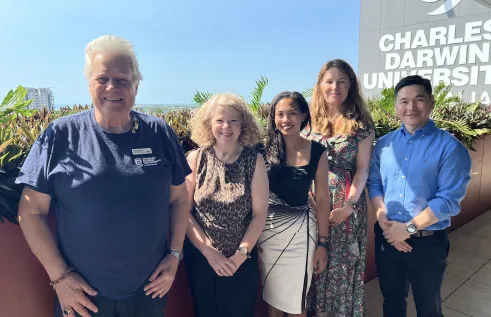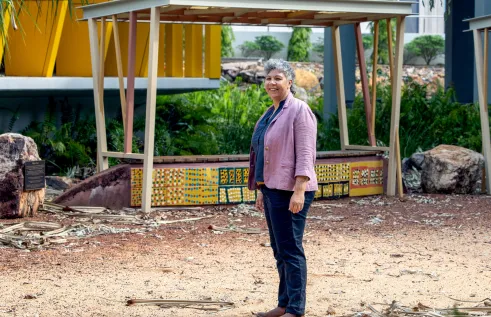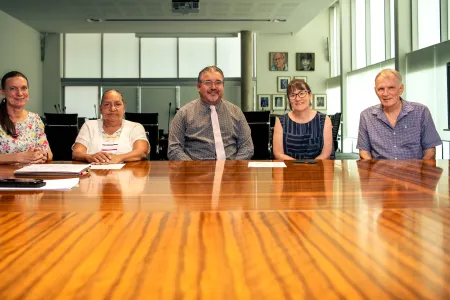News
MOU to focus on using Indigenous knowledge to empower remote NT communities
A Memorandum of Understanding (MOU) between Charles Darwin University (CDU) and the Remote Indigenous Parents Australia National Indigenous Corporation (RIPA) will aim to create more connected and inclusive schools and communities in the Northern Territory.
The MOU co-signed this week by CDU’s Deputy Vice-Chancellor First Nations Leadership and Engagement Reuben Bolt and John Morgan of RIPA, will foster a partnership between the two organisations through a research project that aims to develop training tools and frameworks for remote communities.
The collaboration, titled The RIPA experience parents and families engagement project, involves members undertaking research and training based on CDU Northern Institute’s Ground Up Research and Monitoring and Evaluation methodology.
The project will begin at the Borroloola School where researchers and RIPA representatives will co-design new training and frameworks to help develop intentional relational dialogue between staff, students and parents.
The aim is to develop a structured way for school staff to mindfully communicate with students and parents who in turn will be empowered to express their education concerns and needs. RIPA Relational Principles of Engagement (RIPA-RPE) is about intentional and consistent practice that grows and sustains positive relationships at every level within the community
It is hoped the results of this research will help create positive learning experiences and more connected and inclusive schools and communities across the Northern Territory.
Professor Bolt said this MOU was an important step in bringing together First Nations knowledge with research and training tools.
“Charles Darwin University is committed to being the nation’s most connected and impactful university and we can do this by working in genuine partnership with organisations such as RIPA, to empower our First Nations people and the University,” Professor Bolt said.
CDU Faculty of Arts and Society Pro Vice-Chancellor Professor Ruth Wallace added it was a privilege for the University to participate in such meaningful work.
“Listening to the perspective of elders, parents and families in remote communities is key to creating an environment where new generations can thrive on country,” Professor Wallace said.
RIPA, which was established in 2017, is a grassroots ‘facilitator’ organisation designed to give parents and families in remote Indigenous communities a greater voice around what matters from their perspective.
RIPA received funding for this project from the Australian Government administered through the National Indigenous Australians Agency (NIAA).
RIPA Co-Chairs John Morgan and Lorraine Bennett said the signing was a vital step to enhancing meaningful and life-changing relationships within remote communities.
“RIPA is delighted to connect with CDU to progress the development of nationally-accredited training, co-designed with First Nations parents and communities,” Mr Morgan said.
“This memorandum with CDU will help us ensure outcomes from the training program are culturally-appropriate, and beneficial for building and sustaining positive relationships.”
Ms Bennett hoped the MOU would lead to long-term change within remote communities.
“It is vital to have an authentic First Nations voice on matters that are of value to us as individuals, our families and communities,” Ms Bennett said.
“We hope to help remote communities connect with each other, develop safe learning spaces to share ideas and communicate, and nurture the health and wellbeing of our young people into the future.”
The funding is for the establishment phase only, but there is hope of gaining more funding in the future to help implement results and then expand the project through the Northern Territory and then eventually Australia wide.
Related Articles

CDU Free Tax Clinic a finalist for prestigious award
Charles Darwin University’s (CDU) Free Tax Clinic has been named one of five finalists for Shaping Australia’s 2025 Community Champion Award.
Read more about CDU Free Tax Clinic a finalist for prestigious award
New education hub launches to train more First Nations teachers
Charles Darwin University (CDU) has officially launched the First Nations Training and Teacher Education Hub, a collaborative initiative designed to grow the next generation of First Nations teachers, educators, and leaders across the Northern Territory.
Read more about New education hub launches to train more First Nations teachers
Social media subjecting Black women to radicalised digital policing
Influencers use oppression, manipulation and weaponisation to police Black women on social media, according to new research uncovering the entrenched nature of digital racism.
Read more about Social media subjecting Black women to radicalised digital policing
